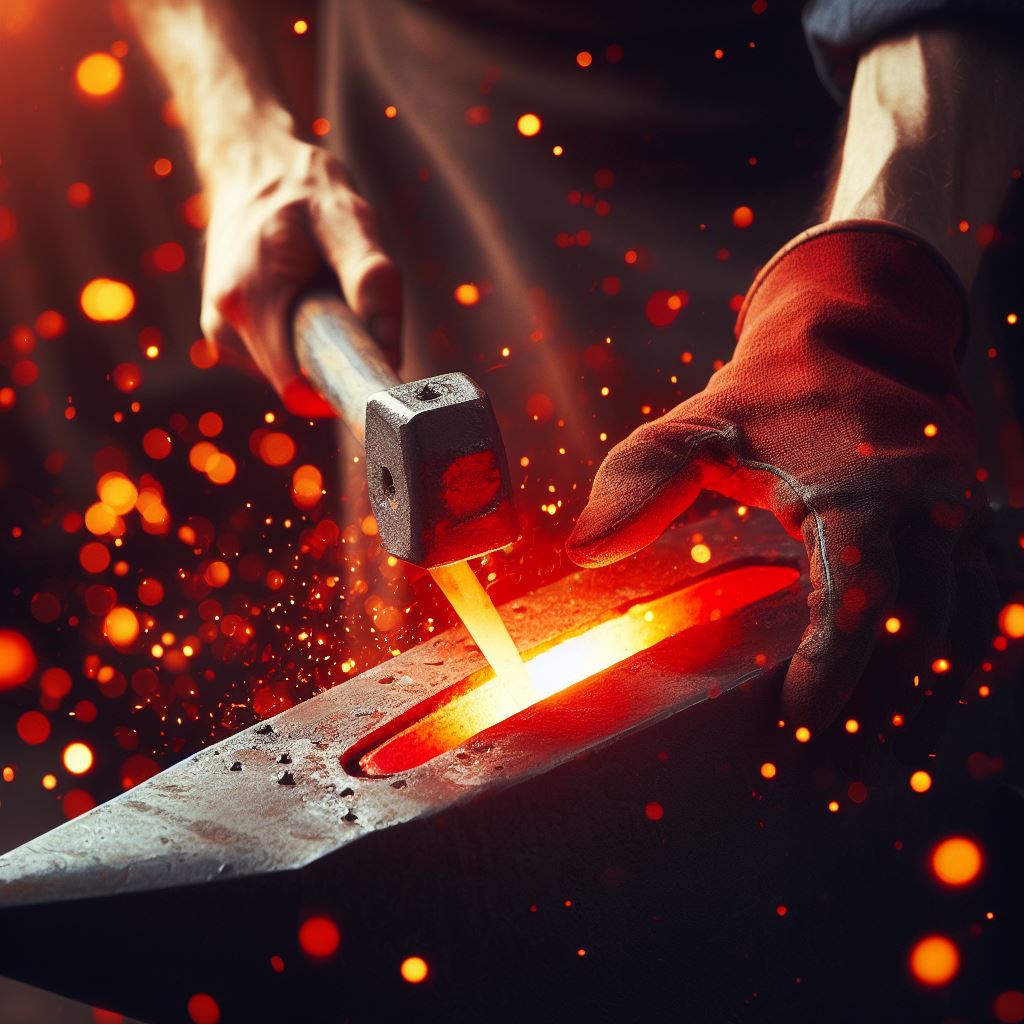Our God is a blacksmith who turns every ore into useful weapons. He sees potential in certain individuals and tries to transform their lives, moulding them into useful instruments. Does God’s choice always yield fruitful results? What about all the ores He has selected that do not become useful metals? Let’s explore how this blacksmith cares for His creations.

The Lord said to Moses, “Tell Eleazer son of Aaron, the priest, to take the censors out of the smouldering remains and scatter the coals some distance away, for the censers are holy – the censers of the men who sinned at the cost of their lives. Hammer the censers into sheets to overlay the altar, for they were presented before the Lord and have become holy. Let them be a sign to the Israelites.” Numbers 16:36-38
Korah, Dathan, and Abiram were three leaders who rebelled against Moses. They claimed to be holy and sought a greater role in the ministry. However, God, knowing their hearts and their rebellious nature, consumed them with His fire when they approached with their censers. These censers were made of bronze, and God instructed Eleazer the priest to collect them. But why did God want these bronze vessels stained with the ashes of those who rebelled, especially when the Israelites were in chaos? Some stood with Moses, acknowledging the divine judgment, while others sided with Korah, asserting their holiness. All God seemed to want was to save those bronze censers. Is God in need of bronze metals that He is on a mission to preserve them?
No, the people who carried the censers might have been unholy, but the censers themselves became holy when God’s fire descended upon them. God’s fire consumed the rebels but also sanctified these objects. In our world, we may encounter many false prophets and misleading preachers, but the individuals who unknowingly follow them may ultimately become sanctified when touched by God’s divine fire. God will appoint individuals akin to Eleazar to collect and shape them according to His will.
Does God always seek to save people for His divine purpose? Not necessarily. Achan was a man who sinned against God by taking plunder for himself. God did not instruct anyone to preserve these ill-gotten gains when the people held Achan accountable. Instead, they destroyed Achan along with his illicit possessions. Likewise, those who lead others away from God will not be spared. Instead, they will face destruction alongside their leaders.
If God loves and cares for His metals, does that mean He will not bring pain and grief to them? Let’s read Numbers 31:21-23, Then Eleazar the priest said to the soldiers who had gone into battle, “This is the requirement of the law that the Lord gave Moses: Gold, silver, bronze, iron, tin lead anything else that can withstand fire must be put through the fire, and then it will be clean. But it must also be purified with the water of cleansing. And whatever cannot withstand fire must be put through that water.”
In this verse, we see that God desires everything capable of withstanding the heat of fire to be subjected to fire for cleansing, while those that cannot endure it are to be immersed in a cleansing water. If water can effectively purify and cleanse, why does God also prescribe the use of fire? Well, God intends for certain special things to be purified through fire according to His divine plan. Metals, being able to endure the intense heat, readily submit to the blacksmith’s forge. If you find yourself going through fiery trials in life, take comfort in the notion that you are a work in progress under the masterful hand of the great blacksmith.
Let’s take a closer look at some of the metals that God possesses:
Iron – Iron is renowned for its strength. It symbolizes strength and resilience. When we think of iron, the first character that often comes to mind is Samson. He possessed the strength of iron, a divine blessing. However, he also exhibited the stubbornness of iron. For instance, when his parents advised him to reconsider his decision to marry a Philistine woman, he rejected their counsel and followed his heart’s desires. Throughout his life, Samson did as he pleased, often neglecting to seek God’s will. Remarkably, even God did not intervene to prevent him, as the Bible suggests, all as part of God’s plan.
Likewise, some of us can be likened to iron. We tend to follow our own desires rather than God’s guidance. We may resist correction from others and remain unyielding, much like iron in a negative sense. However, it’s essential to remember that even the mightiest iron can rust over time, teaching us that our unyielding nature can eventually lead to our downfall.
Bronze – This metal, while shining like gold, holds less value than gold. It is also prone to corrosion, although not as severely. One character often associated with bronze is Hezekiah, a king of Judah. Hezekiah is remembered for his many righteous deeds in his kingdom. However, the Bible also reveals his inner thoughts. When the prophet Isaiah foretold doom for his kingdom, Hezekiah believed that the consequences would befall future generations and saw no need for concern. He forgot that he was a man who had previously changed God’s mind but failed to plead to God once more. God had instructed him to put his house in order, but he neglected to do so. He seemed more preoccupied with what others would think of him. He aspired to shine like gold in the eyes of the world, yet his heart did not possess the purity of gold.
Silver – Silver, akin to gold, is esteemed for its purity and refinement. However, it doesn’t possess the same lustrous shine as gold. Instead, it reflects light in its unique way. It wouldn’t be inappropriate to liken Isaac to silver. When Abraham took him to Mount Moriah for sacrifice, Isaac exhibited purity and obedience by willingly complying with his father’s request. However, he didn’t play as active a role as his father did in many aspects. He enjoyed the blessings bestowed upon him by Abraham. Isaac lacked the discernment to bless Jacob instead of Esau, a task that Rebekah, his wife, understood and acted upon as part of God’s plan.
Gold – Gold is undeniably one of the most precious metals on Earth. It is known for its brilliant shine and exceptional resistance to reactivity. Gold is also highly malleable and ductile, making it a metal that can be easily shaped. These are the very qualities that make it a preferred choice for God when it comes to individuals who can be moulded according to His divine plan. In this category, we can consider characters like Abraham and David. They both exemplified the qualities of gold in their relationship with God. They consistently sought God’s will and wholeheartedly followed it. Their desire was to surrender to God’s purpose, even if it meant facing consequences. They did not react to the noise of the world but instead radiated the glory of God.
What type of metal are you? What type of metal do you want to be? Every metal will be used by God and will be polished and stored in the QUIVER OF GOD.



May God bless you all. If you want this message in Hindi, stay tuned in Quiver of God youtube channel.